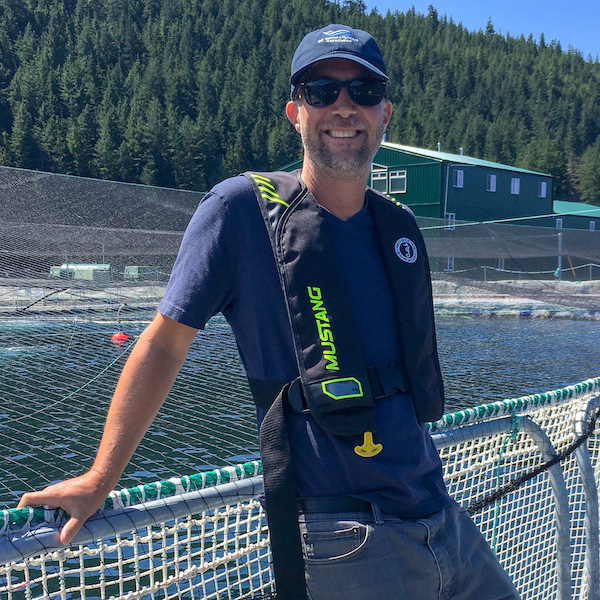Salmon farmers carbon footprint
British Columbia’s salmon farming industry has a low carbon footprint, raises responsibly sourced food, and is committed to saving wild salmon for future generations.
Long ago, the late famed ocean conservationist Jacques Cousteau called on us to stop hunting the oceans and to start farming them. We are doing that here in B.C., with great pride and a carbon footprint you can barely see.
Ocean-based salmon farms are powered largely by clean, limitless ocean currents rather than electricity and oil, which positions the industry to meet the world’s growing demand for healthy, nutrient-rich protein while reducing environmental stress to our planet.
A carbon footprint measures the total greenhouse gas emissions caused directly and indirectly by the production of a product. Carbon footprint is measured in kg of carbon dioxide equivalent (CO2e) per kg edible protein of the product.
The recent agreement between the provincial government and the B.C. Business Council to make the province a low-carbon economy leader is a powerful statement of the aquaculture industry values.
The salmon farmers are already setting the example with farmed salmon, which is raised with very small greenhouse gas emissions.
B.C. salmon farmers emit only 2.2 kilograms of carbon dioxide for every kilogram of edible fish produced. That is less than half of any animal raised on land, including 5.1 kilograms of CO2 per kilogram of chicken, 6.4 kilograms for pork, and 37.2 kilograms for beef.
In addition, salmon are cold-blooded, so they convert more of the food they eat to muscle than warm-blooded animals farmed on land – only 1.1 kilograms of feed is needed to increase a farmed salmon’s weight by one kilogram, while it takes 1.9 kilograms of feed for chicken, 3.8 kilograms for pork and 8.0 kilograms for beef.
British Columbians can be confident that the salmon farming industry is one of the most highly regulated food growing sectors in Canada. Salmon farmers are also committed to gaining a 100 per cent Aquaculture Stewardship Council (ASC) certification by 2020 — the most stringent, voluntary, ocean-based farming certification in the world.
Farmed and wild salmon
Wild salmon are under pressure from climate change, over-fishing, and loss of habitat. Locally raised farmed salmon can take the burden of feeding families far more readily than fragile wild salmon populations.
The BC salmon farmers provide a sustainable alternative to the mass consumption of wild salmon.
The salmon farming industry in British Columbia supports wild salmon hatcheries and fund habitat restoration and protection.
Supports, and fund independent research into the health of both wild and farmed salmon, and act on the results.
Invests in clean technology, to provide even greater levels of protection for wild salmon.
The world’s population is growing and it is hungry. Climate change is depleting our ability to grow food on land and warming waters are taking a heavy toll on pacific salmon.
This op-ed originally appeared in the Vancouver Sun
RELATED LINKS:
Sustainability is an Important factor to consider
Canada to move ahead with a Federal Aquaculture Act
Feds announce a special fund for wild Pacific salmon
Scientists go fishing for salmon answers

